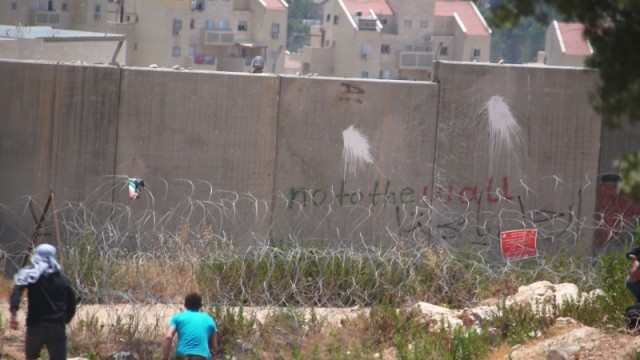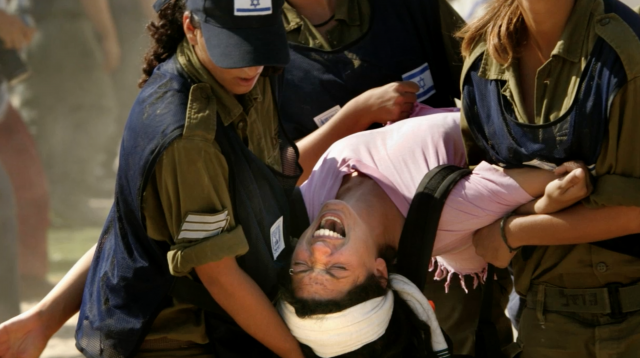
The Separation Wall in Belin keeps Jews and Palestinians apart in the West Bank
COLLIDING DREAMS (Joseph Dorman & Oren Rudavsky, 2015)
Lincoln Plaza Cinema
1886 Broadway at 63rd St.
Opens Friday, March 4
212-757-2280
collidingdreamsthemovie.com
www.lincolnplazacinema.com
 In Colliding Dreams, cowriters, directors, and producers Joseph Dorman and Oren Rudavsky take a unique and compelling angle in their exploration of the relationship between Jews and Palestinians in what became the State of Israel in 1948. Not only do they show that Zionism means different things to different people, but they also make it clear that when the British “gave” Palestine to the Jews, it was not theirs to give in the first place, and it just so happened that someone else was already living there. “Now, this is a very important point which I would like to make. People don’t usually make it,” explains Kobi Sharett, the director of the Moshe Sharett Heritage Society, which preserves the legacy of his father, the second prime minister of Israel. “And I learned it from my father. He said, in all cases where you have under the pressure of the influence of war, when whole populations change places, move outside, it is always a rule that the minority is leaving and the majority is staying. They are not feeling secure in the place. The case of Palestine is the only one where the majority fled, not the minority. This is why the problem of the refugees is still with us to this very day.” Using archival footage and new interviews, Dorman and Oren Rudavsky trace the history of Zionism and the search for a Jewish state from the 1880s to the present, speaking with a wide range of Jewish and Palestinian historians, professors, authors, politicians, and journalists as well as everyday people on the street. Everyone interviewed lives in the country; they include Hebrew University professors Avishai Margalit, Moshe Halbertal, and Ruth Gavison, PLO executive committee member Hanan Ashrawi, Mossowa Center director Jafar Farah, and peace activists A. B. Yehoshua, Mordecai Bar On, Motti Lerner, Orly Noy, Yuli Tamir, and Saman Khoury. One critical element that becomes obvious early on is how far we are from any kind of consensus; everyone has different views on whether there should be a one-state or two-state solution, what should be done with the settlements in the West Bank, just what Zionism really is, and who has the ultimate right to the land. Khalil Shikaki, the director of the Palestinian Center for Policy and Survey Research, remembers thinking, upon seeing Israeli soldiers in contested territory, “We wanted to say, ‘Go home.’ And you should see the debate that went down between us. People would ask, ‘Where’s home?’”
In Colliding Dreams, cowriters, directors, and producers Joseph Dorman and Oren Rudavsky take a unique and compelling angle in their exploration of the relationship between Jews and Palestinians in what became the State of Israel in 1948. Not only do they show that Zionism means different things to different people, but they also make it clear that when the British “gave” Palestine to the Jews, it was not theirs to give in the first place, and it just so happened that someone else was already living there. “Now, this is a very important point which I would like to make. People don’t usually make it,” explains Kobi Sharett, the director of the Moshe Sharett Heritage Society, which preserves the legacy of his father, the second prime minister of Israel. “And I learned it from my father. He said, in all cases where you have under the pressure of the influence of war, when whole populations change places, move outside, it is always a rule that the minority is leaving and the majority is staying. They are not feeling secure in the place. The case of Palestine is the only one where the majority fled, not the minority. This is why the problem of the refugees is still with us to this very day.” Using archival footage and new interviews, Dorman and Oren Rudavsky trace the history of Zionism and the search for a Jewish state from the 1880s to the present, speaking with a wide range of Jewish and Palestinian historians, professors, authors, politicians, and journalists as well as everyday people on the street. Everyone interviewed lives in the country; they include Hebrew University professors Avishai Margalit, Moshe Halbertal, and Ruth Gavison, PLO executive committee member Hanan Ashrawi, Mossowa Center director Jafar Farah, and peace activists A. B. Yehoshua, Mordecai Bar On, Motti Lerner, Orly Noy, Yuli Tamir, and Saman Khoury. One critical element that becomes obvious early on is how far we are from any kind of consensus; everyone has different views on whether there should be a one-state or two-state solution, what should be done with the settlements in the West Bank, just what Zionism really is, and who has the ultimate right to the land. Khalil Shikaki, the director of the Palestinian Center for Policy and Survey Research, remembers thinking, upon seeing Israeli soldiers in contested territory, “We wanted to say, ‘Go home.’ And you should see the debate that went down between us. People would ask, ‘Where’s home?’”

Israeli soldiers evict a Jewish soldier in COLLIDING DREAMS
In their lengthy director’s statements, Guggenheim Fellow Rudavsky (A Life Apart: Hasidism in America, Hiding and Seeking) and Peabody Award winner Dorman (Arguing the World, Sholem Aleichem: Laughing in the Darkness) don’t shy away from their own Judaism while pointing out that they are not taking sides in the controversies depicted in the film. “It challenges the idea that only one narrative is worthy and suggests that to find peace, all narratives must be considered,” Rudavsky says, while Dorman adds, “To understand that there are two separate national narratives is also to understand that at base they can never be fully reconciled. . . . But these narratives don’t have to be reconciled. They simply must be lived with and mutually recognized for national coexistence to be possible.” That view itself is controversial to some, but Rudavsky and Dorman, who are both based in New York City, along with editors Aaron Kuhn and Nick August-Perna, do an excellent job of cutting between the contemporary interviews and the historical footage as they examine such pivotal Jewish figures as Leon Pinsker, Theodor Herzl, Vladimir Jabotinsky, Rav Abraham Isaac Kook, Yitzhak Rabin, and Menachem Begin; such battles as the Arab Revolt, the First Intifada, and wars in 1948, 1967, and 1973; and myriad political solutions that nearly all backfire. The film opens as Israelis stop whatever they’re doing and stand still for a moment of silence on Remembrance Day, getting out of their cars in the middle of traffic, halting on sidewalks, honoring those who have been lost through war and terrorism. It’s a powerful, melancholic way to start a movie, and by the conclusion, more than two hours later, no matter what side of the fence (wall?) you’re on, it’s difficult to not want all the senseless bickering and violence to end so no more men, women, and children will need to be memorialized in such a way ever again.